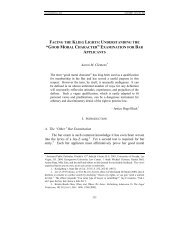Calendar 2005-2006 - The University of Akron
Calendar 2005-2006 - The University of Akron
Calendar 2005-2006 - The University of Akron
You also want an ePaper? Increase the reach of your titles
YUMPU automatically turns print PDFs into web optimized ePapers that Google loves.
Credits<br />
7700:101, 2 American Sign Language I, II 6<br />
7700:201, 2 American Sign Language III, IV 6<br />
7700:222 Survey <strong>of</strong> the Deaf Culture in America 2<br />
• Completion <strong>of</strong> requirements in a major field <strong>of</strong> study (see Programs <strong>of</strong><br />
Instruction) and the recommendation <strong>of</strong> the student’s major department.<br />
• Attaining a minimum grade-point average <strong>of</strong> 2.00 in all work attempted in the<br />
major field at <strong>The</strong> <strong>University</strong> <strong>of</strong> <strong>Akron</strong>. (Political Science 2.2, Sociology 2.2)<br />
• Attaining a minimum grade-point average <strong>of</strong> 2.00 in all work in the major field,<br />
including transfer credits. (Political Science 2.2, Sociology 2.2)<br />
• Fulfilling the <strong>University</strong> requirements for a baccalaureate degree set forth in<br />
Section 3 <strong>of</strong> this Bulletin.<br />
Any student who wishes to receive a second baccalaureate degree must complete<br />
32 credits <strong>of</strong> course work in addition to the credits necessary for the first degree;<br />
16 <strong>of</strong> the 32 credits must be in 300/400-level courses or other approved courses.<br />
Degrees Awarded<br />
Humanities Division: Bachelor <strong>of</strong> Arts.<br />
Natural Sciences Division: Bachelor <strong>of</strong> Arts, Bachelor <strong>of</strong> Science, Bachelor <strong>of</strong><br />
Science in Computer Science.<br />
Social Sciences Division: Bachelor <strong>of</strong> Arts, Bachelor <strong>of</strong> Science in<br />
Geography/Geographic Information Sciences, Bachelor <strong>of</strong> Science in Labor<br />
Economics, Bachelor <strong>of</strong> Science in Political Science/Criminal Justice.<br />
Interdisciplinary Studies: Bachelor <strong>of</strong> Arts in Interdisciplinary Anthropology,<br />
Bachelor <strong>of</strong> Arts in Interdisciplinary Studies<br />
Preparation for High School<br />
Teaching<br />
A student interested in a teaching career on the high school level may qualify for<br />
secondary school licensure by the Ohio State Department <strong>of</strong> Education while<br />
enrolled in Buchtel College <strong>of</strong> Arts and Sciences. Generally the arts and sciences<br />
major subject will also constitute a teaching major, although a second teaching<br />
field usually is required. <strong>The</strong> education and psychology courses required for the<br />
secondary school teaching license may be taken as electives toward the arts and<br />
sciences degrees. Additional elective credits will generally enable the student to<br />
meet the requirement <strong>of</strong> a second teaching field, without exceeding the credits<br />
necessary for graduation.<br />
<strong>The</strong> number <strong>of</strong> credits in a teaching field required for licensure can be determined<br />
by referring to Section 4, College <strong>of</strong> Education, “Teaching Fields,”<br />
located in this Bulletin.<br />
Minor Areas <strong>of</strong> Study<br />
For an explanation <strong>of</strong> minor areas <strong>of</strong> study in Buchtel College <strong>of</strong> Arts and<br />
Sciences, see Section 5 <strong>of</strong> this Bulletin.<br />
Interdisciplinary and Certificate<br />
Programs <strong>of</strong> Study<br />
For an explanation <strong>of</strong> interdisciplinary and certificate programs <strong>of</strong> study, see<br />
Section 6 <strong>of</strong> this Bulletin.<br />
Buchtel College <strong>of</strong> Arts and Sciences <strong>2005</strong>-<strong>2006</strong> 103<br />
PROGRAMS OF<br />
INSTRUCTION<br />
Bachelor <strong>of</strong> Arts in<br />
Interdisciplinary Studies<br />
This degree meets the needs <strong>of</strong> students who have an interdisciplinary academic<br />
goal. It expands opportunities for non-traditional students to complete their<br />
degrees at <strong>The</strong> <strong>University</strong> <strong>of</strong> <strong>Akron</strong> by allowing them to combine courses from<br />
various colleges to design a program. Students pursuing this degree must select<br />
a College <strong>of</strong> residence, devise a proposed program <strong>of</strong> study with an advisor in the<br />
college selected. <strong>The</strong> proposal must be approved by <strong>University</strong> Interdisciplinary<br />
Studies Committee. For more information on the program, see page 101.<br />
3100: Biology<br />
Bachelor <strong>of</strong> Science<br />
• <strong>The</strong> General Education requirement and the second year <strong>of</strong> a foreign language.<br />
• Core requirements: All majors for a Bachelor <strong>of</strong> Science in Biology take the<br />
sequence <strong>of</strong> courses listed below, which will provide an understanding <strong>of</strong> the<br />
fundamentals <strong>of</strong> modern biology.<br />
Credits<br />
3100:111,2 Principles <strong>of</strong> Biology I, II 8<br />
3100:211,2 General Genetics, Lab 4<br />
3100:217 General Ecology 3<br />
3100:316 Evolutionary Biology 3<br />
3100:311 Cell and Molecular Biology 4<br />
3150:151,3,2 Principles <strong>of</strong> Chemistry I, II, and Laboratory 7<br />
3150:154 Qualitative Analysis 2<br />
3150:263,4,5,6 Organic Chemistry I, II/Lab I, II 10<br />
3450:145,47 College Algebra; Trigonometry and Advanced Algebra 7<br />
or<br />
3450:149 Precalculus Mathematics 4<br />
• A minimum <strong>of</strong> 40 credits in biology is necessary to qualify for a Bachelor <strong>of</strong><br />
Science degree. <strong>The</strong> minimum <strong>of</strong> 18 credits past the biology core curriculum<br />
(above) to satisfy this requirement must be at the 300/400 level. Additional<br />
courses in biology or other sciences are usually necessary to satisfy the admission<br />
requirements <strong>of</strong> graduate and pr<strong>of</strong>essional schools for advanced work and<br />
pr<strong>of</strong>essional studies.<br />
• Recommended:<br />
3460:125 Descriptive Computer Science 2<br />
3470:261,2 Introductory Statistics I,II 4<br />
• A student majoring in biology should consult a member <strong>of</strong> the biology faculty<br />
during the first year.<br />
Areas <strong>of</strong> Specialization (Optional)<br />
If a student wishes to obtain a B.S. degree with a designated Area <strong>of</strong> Specialization<br />
within Biology, the student must take the required courses listed below for<br />
that specific area. Additional courses are listed as electives that may be taken to<br />
further strengthen a student’s knowledge in a particular area. <strong>The</strong> area <strong>of</strong> specialization<br />
will appear on the student’s transcript.<br />
Most <strong>of</strong> these courses will be taken during the third or fourth years:<br />
Botany Specialization<br />
Required:<br />
3100:342 Flora and Taxonomy 3<br />
3100:440 Mycology 4<br />
or<br />
3100:443 Phycology 4<br />
3100:441 Plant Development 4<br />
or<br />
3100:445 Plant Morphology 4<br />
3100:442 Plant Anatomy 3<br />
Electives:<br />
3100:400 Food Plants 2

















